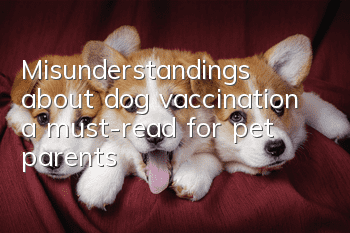Misunderstandings about dog vaccination, a must-read for pet parents

Myth: Dogs rarely or never go out, they are not contagious and do not need to be vaccinated.
Answer: As the number of pets increases, the density increases rapidly, the exchanges between relatives and friends, and the owners’ outings may bring the virus to the dogs at home.
Myth: Someone else’s dog got sick after being vaccinated, so the vaccine cannot be given.
Answer: There are many taboos when vaccinating. If the owner ignores some conditions that make the dog unsuitable for immunization and rashly immunizes it, or uses vaccines of poor quality, expired, or improper storage, or even worse, Encountering a hospital with low medical ethics and low technology will definitely have negative consequences. But this does not mean that all dogs will get sick after being vaccinated, nor does it mean that the vaccine should not be given.
Myth: It is safe to be vaccinated. You should get vaccinated as soon as you buy the puppy.
Answer: When unvaccinated puppies enter a new environment, they must gradually adapt to their diet and rest. If the puppy comes from a market where the environment is dirty, plague is rampant, and the puppy suffers from hunger and cold, his physical condition must be very poor, and he is often infected with terrible diseases. At this time, vaccination will be counterproductive. You should go to the hospital to inject serum, nurse and observe for about 10 days, and then immunize if there is no problem.
Myth: Pregnant dog mothers can be vaccinated, which can bring antibodies to their children.
Answer: The attenuated vaccine reacts strongly after injection and may damage the fetus. The instructions for this type of vaccine clearly state "Contraindicated for pregnant dogs." If the dog's mother's vaccination time happens to be at this time, she should wait until after breastfeeding.
Myth: Vaccines are so important, so get them as early as possible.
Answer: If the vaccine is injected too young, it may be interfered by maternal antibodies and affect the immune effect. The first dose of the two-part vaccine should be given after the puppy is 30 days old, and the first shot of rabies vaccine should be given after the puppy is three months old.
Myth: Infectious diseases are too scary. If you see something is wrong with your puppy, you should get vaccinated immediately
Answer: The purpose of vaccines is prevention, not treatment. If the puppy has been infected with the virus, or has poor physique and nutrition, vaccination will harm it. It should be treated symptomatically, adjust the body, and adapt to the environment, and then be immunized when it is very healthy.
Myth: After vaccination, the dog’s health is 100% guaranteed.
Answer: There are hundreds of diseases that can occur in dogs, and vaccines can only prevent six or seven of them. Even if you are vaccinated, you should pay careful attention to your dog's health. When the dog is too young or too old, has a weak constitution, a local infectious disease breaks out, or the previous year's vaccine is about to expire, corresponding preventive or rescue measures should be taken immediately.
Myth: The first year of vaccination is the most important, and the vaccines every year thereafter do not matter.
Answer: We must pay attention to the vaccine every year, and the annual vaccine should be injected about half a month earlier than the previous year to prevent accidents when the vaccine is about to expire. There have been too many tragedies around us where owners did not pay attention to the regular immunization of dogs after they became adults, causing dogs to suffer fatal infections.
- How to treat dog fever
- Alaska likes owner behavior
- Dog’s nose has hard lumps and scabs
- Why does Teddy's fur turn white?
- How to quickly ventilate a dog’s cold and stuffy nose
- How often should a dog be bathed?
- What are dog anal glands? These dogs are most likely to have problems with their anal glands!
- Will dogs get cold if they sleep on the ground in winter? Not only will they get cold, but they will also get sick!
- How to support German Shepherd breeding? Don’t help!
- What to do if your dog’s nails have blood lines that are too long. You must trim your dog’s nails regularly.



